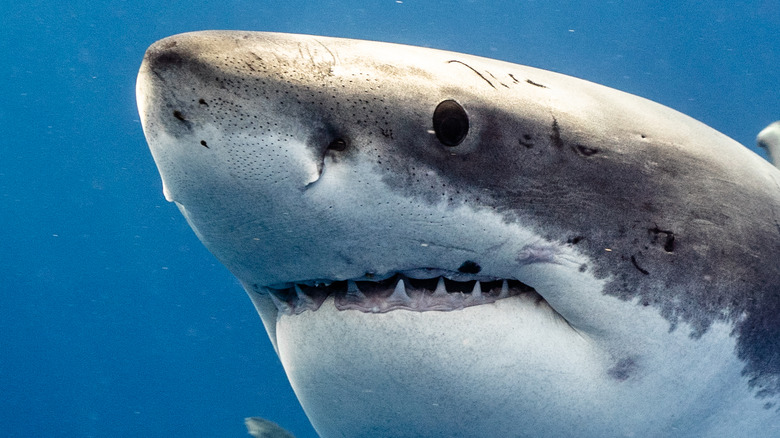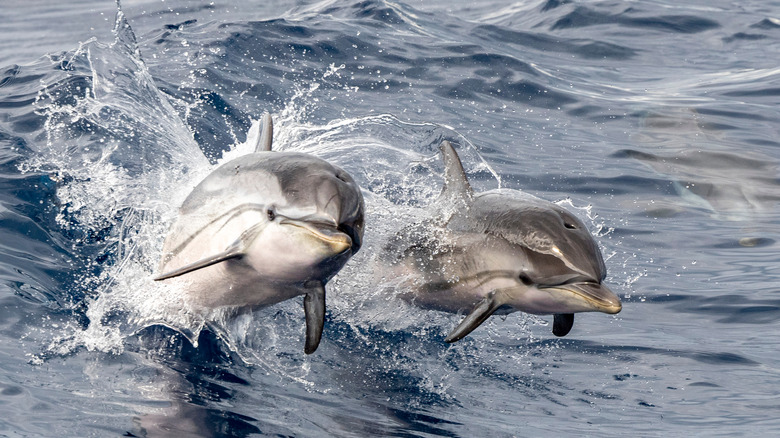The Seemingly Friendly Animal That Sharks Want Nothing To Do With
Sharks are some of the most fearsome predators on Earth, never mind those confined strictly to the oceans. Rows of razor-sharp teeth and the ability to sniff out a drop of blood a quarter of a mile away make them the stuff of nightmares for a large portion of the population. However, for the most part, those fears are unfounded. According to the National Ocean Service, the truth of the matter is that most sharks don't pose a direct danger to humans. There are hundreds of species of sharks cruising around the world, and of those, only about a dozen have been documented to have attacked people.
However, humans aren't alone in having fears regarding an ocean dweller. According to SeaWorld, sharks have their own hangups when it comes to, of all creatures, dolphins. Even though sharks are regarded as one of the ocean's top predators, dolphins seem to have a bit of an advantage when it comes to intelligence and several physical adaptations.
Dolphins aren't east prey for sharks
According to SeaWorld, a dolphin is a tall order for a shark looking for a quick meal. Sharks are typically solitary predators, which works fine most of the time, but dolphins tend to stick together in groups, or pods. This means that even if a shark were to try to attack a member of the pod, they would be met with defense from the other dolphins, effectively leaving the shark heavily outnumbered.
Of course, this is only if they can even catch a dolphin in the first place. Because shark tails are vertical, it makes it more difficult for sharks to move up and down in the water. Dolphins, however, have a horizontal tail — coupled with a flexible build — which allows them to change directions on a dime. A dolphin's agility makes it easier to evade a shark even if the latter has more outright, straight-line speed.
If by some chance a shark does manage to catch a dolphin, the dolphin does have a defense mechanism: its snout. A dolphin's snout is made of bone and can be used like a battering ram. A well-placed jab to a shark's soft underside can lead to internal injuries.
Orcas are sharks' greatest foes
Despite the nickname "killer whales," orcas are actually part of the dolphin family, and they're probably the member of the family sharks would fear the most. According to SeaWorld, orcas are widely considered the ocean's true apex predators. They've even been known to hunt great white sharks if other food sources are dwindling.
Orcas can also outsmart sharks, to the point that it seems like they have a cursory understanding of shark biology. Orcas have been observed using their tails to flip sharks onto their backs. When a shark is on its back, it's believed that they become disoriented and enter a state of near hypnosis, known as tonic immobility, per Shark Trust. This is a phenomenon that researchers take advantage of when working with sharks, but apparently, orcas are privy to this, too, and use it as a hunting tool to catch a quick meal.
Does seeing dolphins mean that sharks aren't around?
There's an old adage that seeing a pod of dolphins racing through the water is a good indicator that the vicinity is shark-free. Unfortunately, despite the tendency for sharks to steer clear of their mammalian neighbors, this isn't true. "If anything, it's the opposite," Stephen Kajiura, a shark expert from Florida Atlantic University, told Live Science, "If you see dolphins, more often than not, there might be sharks in that same area."
Both animals are carnivores, and as such often go to the same areas to track down food. While the two generally try to keep their distance from each other, Kajiura notes that dolphins tend to be the aggressors in these situations. This usually happens if the dolphin feels threatened and they'll use their snouts to poke sharks or even try to body slam them. Sometimes sharks wind up beaten and bruised from these confrontations, though that's rare.
So, the truth is that seeing sharks isn't a signal that the water is sharkless. Although there is abundant anecdotal evidence of dolphins protecting human swimmers from sharks (via The Guardian), the best way to stay safe while swimming in shark territory is to avoid going into the water in the morning or evening. This is when visibility is at its lowest and it becomes more difficult for sharks to determine what is a swimmer or surfer and what is a seal.



